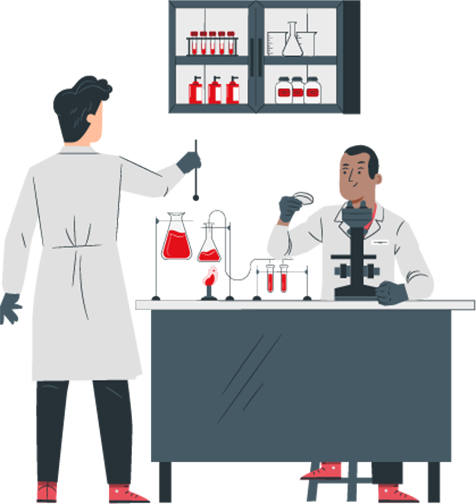
Let Dr. Gaur
Recommend A Package For You
STARTING FROM ₹399*

100+ TrustedLabPartners #OurBloodRelations


100+ TrustedLabPartners#OurBloodRelations


Activated Partial Thromboplastin Test In Chandigarh
The activated partial thromboplastin test or APTT test is requested when a person is suspected to have disorders that hamper the coagulation system of the body. Clotting of blood is an essential feature that ensures survival. When the body suffers an injury that causes the skin to tear, blood rushes out. But, after a while, the blood flow stops, and a thick substance is seen over the cut. This is a clot, which prevents the blood from flowing out. When the person is healthy, they can form clots at a normal speed and also recover faster.
AN OVERVIEW
About Activated Partial Thromboplastin Test
Why is the Activated Partial Thromboplastin test done?
Hemostasis is a natural healing process that helps the body to stop bleeding. This process aids in coagulation along with clotting factors. The majority of the clotting factors are produced in the liver.
The activated partial thromboplastin test or APTT test is prescribed when a person shows symptoms of having conditions that affect the coagulation of blood or deficiencies that result in slow or no clotting of blood. Symptoms or conditions that prompt a doctor to prescribe the APTT test are:
- Bleeding heavily without any cause
- Bruise forms easily
- A blood clot is present in the artery or vein
- Having liver disorders
- About to get operated
- Suffered miscarriage
- Taking prescribed blood thinners, like heparin
What does the Activated Partial Thromboplastin test measure?
Thromboplastin is the factor that converts prothrombin to thrombin that forms the clot. The speed with which this conversion is done determines how soon the cut will be sealed and the bleeding stopped. While the clotting time can be calculated with partial thromboplastin time or PTT test, the activated partial thromboplastin time or APTT test adds a catalyst to hasten the clotting time.
In fact, the APTT test is the chosen test for heparin therapy patients as a monitoring and screening test. The activated partial thromboplastin time test evaluates all the clotting factors and pathways that aid in clotting. Calcium and phospholipid emulsion is added to activate the thromboplastin and the time taken for a clot to form is calculated. This result is then compared to the clot formation time taken when the test is performed using the blood sample of a healthy person.
Potential risks/side effects associated with the Activated Partial Thromboplastin test
The APTT test is done by collecting blood samples from the patient. Since this test is usually prescribed for patients suffering from clotting disorders or those suspected of having conditions that lead to heavy bleeding, the drawing of blood needs to be done carefully, under observation. Side effects might be nausea or fainting, but they go away when the person rests a bit. Apart from these, the collection of samples poses no serious threats.
ABOUT US
Why Choose Flebo.in’s Home Collection Service?
Searching for “APTT Test cost”? Flebo.in provides the best APTT test in Chandigarh at an affordable price. The company aims to offer customer satisfaction via services tailored to meet the needs of the patient. The availability of home blood sample collection slots on a daily basis between 6 am to 9 pm helps people to not wait for long.
The company provides details about the phlebotomist who will be in charge of collecting the blood samples and this transparency makes Flebo.in a class apart from the rest.
FREQUENTLY ASKED QUESTIONS
FAQs
What is von Willebrand disease?
This is a lifelong condition due to improper functioning of the von Willebrand factor.
Can bleeding disorders be genetic?
Yes, the inability to form a clot at a normal speed can be due to genetic factors, like hemophilia.


THINGS TO KNOW AFTER GETTING TESTED
Interpreting the Activated Partial Thromboplastin test results
The normal time taken for a clot to form is between 10 seconds to 13 seconds. The brain gets the signal that a cut has been formed and blood is flowing out. This message is then given to the pathways and factors to do the job of sealing the cut.
When the time taken for the clot to form is longer than the normal time, it indicates that the person can have:
- Bleeding disorders, like von Willebrand disease or hemophilia
- Liver disorders
- Autoimmune disorders, like lupus anticoagulant syndrome
- Deficiency of vitamin K
Customer Reviews
Some of Flebo.in's customers reviews
STEPS OF BOOKING
Steps To Book Activated Partial Thromboplastin test Home Collection In Chandigarh
Our state-of-the-art user interface makes the process of booking a painless sample collection test hassle-free, time-efficient, and convenient. Instead of searching for “Activated Partial Thromboplastin test near me” or “Activated Partial Thromboplastin test in Chandigarh,” you can do the following:
Phone Number
an OTP
Details
Appointment



